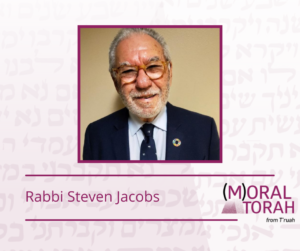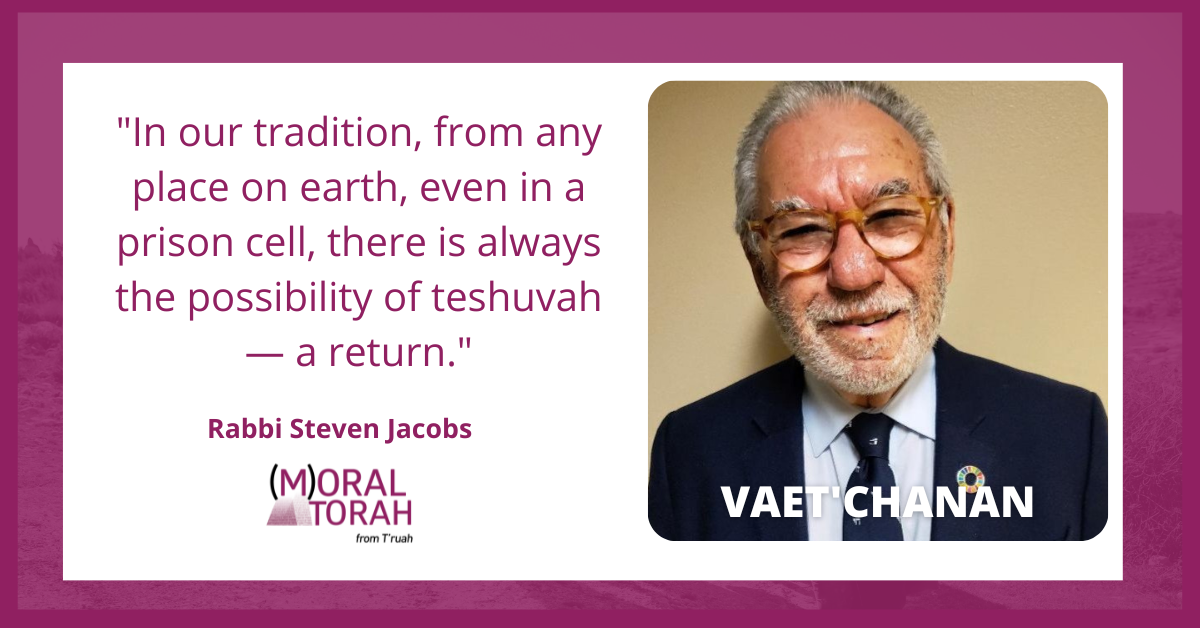A D’var Torah for Parshat VaEt’chanan by Rabbi Steven Jacobs
In this week’s parshah, we return to the topic of cities of refuge, first introduced at the end of Numbers. (See Rabbi David Eber’s (M)oral Torah on the subject two weeks ago.) God had commanded that the Israelites set aside six cities of refuge for individuals who commit murder accidentally — a place where they could live without fear of retribution. Moses, though he will never enter the land, now sets aside the three on the east side of the Jordan River, outside the Land of Israel proper, in the territory of the tribes of Reuben, Gad, and Manasseh (Deuteronomy 4:41-43).
These cities represent the triumph of hope over despair.
Moses performed this mitzvah even though he would never enter the land. His anticipation and recognition of the opportunity to do God’s work extended even to a mitzvah he would never see come to fruition.
In biblical times, cities of hope provided a refuge. Today, our criminal justice system offers too little hope to those who become ensnared in its pervasive net.
Sign up to receive (M)oral Torah in your inbox each week.
The Sentencing Project shares some stark statistics on incarceration in America:
- There are 2 million people in the nation’s prisons and jails — a 500% increase over the last 40 years.
- One in seven people in prison is serving life with parole, life without parole, or virtual life (50 years or more).
- Black men are six times as likely to be incarcerated as white men, and Latinos are 2.5 times as likely. For Black men in their thirties, about 1 in every 12 is in prison or jail on any given day.
We are taught that God is with us in the “narrowest” of places. The average American jail cell is just 48 square feet.
Many of us have sung “kol ha’olam kulo gesher tzar me’od” — “the world is a narrow bridge, but the essence is not to be afraid.” While most focus on the “gesher,” the bridge, it’s the “tzar,” the narrow, where we see a connection to this parshah. Our relationship to the Divine can be found in the narrowest of places, even a tiny jail cell or in the depths of our failed relations with our fellow humans.
We have excellent mentors who teach us that hope can be found even in the darkest moments. Indeed, refuge can be found in many forms.
As a rabbi, I have visited people who are incarcerated, including for violence and murder. Often, they have been jailed for 20 years or more. What is astonishing and significant to me is their work to repent and their rehabilitation. In the last year, three of these individuals were paroled and released after lengthy incarcerations. Each of them immediately started doing remarkable things in their communities. Their perseverance to repair the world every day enables them to be free at last.
Rav Zalmon Sarotzkin (Ukraine, 1881–1966), in his commentary on this parshah, teaches that all of us are guarantors, one for the other. We owe it to our neshamah/soul and fellow humans to share our Torah and open windows to help others access it. With this in mind, we honor those in every community who work to provide Torah and emotional support for incarcerated individuals and their families.
Find more commentaries on Parshat VaEt’chanan.
Nelson Mandela taught us a great deal on the concepts of incarceration, refuge, and redemption. First, he taught us that to know a nation is to look inside its jails. Second, he taught us that courage is not the absence of fear but the triumph over it.
In our advocacy community in the U.S., the Reform Alliance is raising awareness about a confusing and contradictory probation system that reincarcerates individuals at an alarming rate. Just as individuals now find themselves back in the community, they must navigate a confusing system that is incentivized to put them back in jail.
 Rebbe Nachman taught that with emunah/faith, there is no despair in the world. In our tradition, from any place on earth, even in a prison cell, there is always the possibility of teshuvah — a return. Each of us is offered the chance to take steps to restore and repair our world and relationships through mitzvot. We have a key to exit our emotional or spiritual incarceration, our own personal Egypt, through the mitzvot. Like Moses, our actions today can provide refuge to the generations that will follow us.
Rebbe Nachman taught that with emunah/faith, there is no despair in the world. In our tradition, from any place on earth, even in a prison cell, there is always the possibility of teshuvah — a return. Each of us is offered the chance to take steps to restore and repair our world and relationships through mitzvot. We have a key to exit our emotional or spiritual incarceration, our own personal Egypt, through the mitzvot. Like Moses, our actions today can provide refuge to the generations that will follow us.
Rabbi Steven Jacobs is a life-long social justice activist and lives in Northern California. He authored this piece with his chevruta, Dan Cohen, a social change communicator who lives in Ra’anana, Israel.

